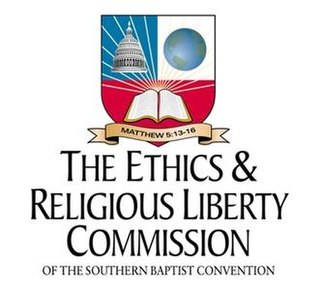Ethics & Religious Liberty Commission
Southern Baptist advocacy group (1997-) From Wikipedia, the free encyclopedia
Southern Baptist advocacy group (1997-) From Wikipedia, the free encyclopedia
The Ethics & Religious Liberty Commission (ERLC) is the public policy arm of the Southern Baptist Convention, the second-largest Christian denomination in the United States. Brent Leatherwood has served as the ERLC president since September 13, 2022.[1] The commission is headquartered in Nashville, Tennessee, with additional offices in Washington, D.C., and Cyprus.
 | |
| Founded | 1947 |
|---|---|
| Founder | Southern Baptist Convention |
| Type | Public policy agency |
| 62-6007072 | |
| Location |
|
Area served | United States |
President | Brent Leatherwood |
Vice President | Miles Mullin |
Employees | 25 |
| Website | erlc |
Formerly called | Christian Life Commission |

Formerly known as the Christian Life Commission (1953–1997), the entity with organizational predecessors dating back to 1907[2] received its current name in the course of a broad reorganization of multiple Southern Baptist entities in 1997.[2]: 335 The Southern Baptist Convention terminated its participation with the Baptist Joint Committee for Religious Liberty in 1992[2]: 300 due to conflicts over separation of church and state and whether Baptist organizations should play a role in partisan politics. It was led by Richard Land from 1988 to 2013. Land announced his intention to retire effective October 23, 2013, after the uproar that ensued from his controversial comments about the Trayvon Martin case that resulted in an official reprimand by the ERLC's executive committee.[3][4] Russell D. Moore filled the post afterwards.[5] Moore was an outspoken critic of then-Republican presidential candidate, Donald Trump. His criticism of Trump was controversial with several Southern Baptist leaders.[6]
The stated vision of the ERLC is an organization "dedicated to engaging the culture with the gospel of Jesus Christ and speaking to issues in the public square for the protection of religious liberty and human flourishing. Our vision can be summed up in three words: kingdom, culture and mission. Since its inception, the ERLC has been defined around a holistic vision of the kingdom of God, leading the culture to change within the church itself and then as the church addresses the world."[7]
At the convention's 2018 annual meeting, a motion to defund the ERLC was rejected.[8] At the convention's 2022 annual meeting in Anaheim, a motion was made to abolish the ERLC, but it was rejected.[9] Again at the convention's 2024 annual meeting in Indianapolis, another motion to abolish the ERLC was also rejected.[10]
On July 22, 2024, the executive committee of the board of trustees of the ERLC issued a statement saying, in part, "In accordance with our bylaws, the executive committee has removed Brent Leatherwood as president."[11] However, on July 23, 2024, the executive committee issued a retraction of that statement and announced that Brent Leatherwood would remain ERLC president.[12] The ERLC later claimed that Kevin Smith, the chair of the executive committee, acted without a formal vote of the board and thus Leatherwood was never actually let go as president.[13] Kevin Smith resigned from the board of trustees and released a statement saying that, after multiple conversations with members of the executive committee, he "was convinced in my mind that we had a consensus to remove Brent Leatherwood as the president of the ERLC."[14]
The agency has many ministries to carry out its stated missions, including voter registration,[15] a think tank called the Research Institute,[16] and the Psalm 139 Project, which donates sonogram machines to crisis pregnancy centers.[17]
ERLC is involved in legislative advocacy. Its achievements include:
The ERLC campaigned unsuccessfully against the 2022 passage of the Respect for Marriage Act, arguing that its gender-neutral definition of marriage contradicted the Bible, and claiming that it is a threat to religious freedom.[21]
| # | Leader[2][22] | Years | Title | Organization name |
|---|---|---|---|---|
| Southern Baptist organized civic engagement prior to Cooperative Program funding | ||||
| - | Arthur James Barton | 1908–1914 | Chairman | Committee on Temperance |
| - | William Louis Poteat | 1913–1914 | Committee on Social Service | |
| 1 | Arthur James Barton | 1914–1920 | Committee on Temperance and Social Service | |
| 1920–1942 | Social Service Commission | |||
| 2 | Jesse B. Weatherspoon | 1942–1947 | ||
| Beginning of Cooperative Program funding | ||||
| 3 | Hugh Alexander Brimm | 1947–1952 | Secretary–Treasurer | Social Service Commission |
| 4 | Acker Calvin Miller | 1953–1960 | Executive Secretary | Christian Life Commission |
| 5 | Foy D. Valentine | 1960–1987 | ||
| 6 | Nathan Larry Baker | 1987–1988 | Executive Director | |
| -[a] | Robert Parham[23][24] | 1988 | ||
| 7 | Richard Land | 1988–1997 | ||
| 1997–2013 | President | Ethics & Religious Liberty Commission | ||
| 8 | Russell D. Moore | 2013–2021 | ||
| -[b] | Daniel Patterson[25] | 2021 | ||
| 9 | Brent Leatherwood | 2021–present[c] | ||
Seamless Wikipedia browsing. On steroids.
Every time you click a link to Wikipedia, Wiktionary or Wikiquote in your browser's search results, it will show the modern Wikiwand interface.
Wikiwand extension is a five stars, simple, with minimum permission required to keep your browsing private, safe and transparent.